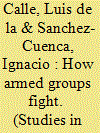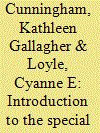| Srl | Item |
| 1 |
ID:
140786


|
|
|
|
|
| Summary/Abstract |
This article analyzes the choice of tactics by armed groups. We claim this choice is largely determined by the capacity of the rebel groups to control territory. Groups that are not able to liberate territory remain underground and have to rely mainly on bombings. Groups with territorial control engage in guerrilla-like attacks in which there is a physical encounter with the enemy. This conjecture is tested and largely confirmed at three levels: a cross-sectional analysis of the distribution of tactics in 122 armed groups, using compositional data analysis; a geographical analysis of the distribution of tactics in the largest cities as opposed to the rest of the country; and a case study of Hezbollah.
|
|
|
|
|
|
|
|
|
|
|
|
|
|
|
|
| 2 |
ID:
177010


|
|
|
|
|
| Summary/Abstract |
Research on conflict processes has recently highlighted the myriad of tactics rebels use which are not violent in nature (cf. Petrova 2019; Ryckman 2020; Cunningham, Dahl, and Frugé 2017). Concurrently, rebel governance has drawn increasing attention from scholars and peacebuilding practitioners. In-depth historical studies of rebel groups highlight the activities and behaviors that rebels engage in beyond making war—such as providing social services and building local political institutions (Mampilly 2011; Arjona 2016a; Arjona, Kasfir, and Mampilly 2015). Complementing these works, studies have sought to provide cross-national examination of trends in these governance behaviors (Huang 2016; Heger and Jung 2017; Stewart 2018). Despite this work, quantitative and formal research in conflict processes often ignores the insights that the rebel governance literature has generated, frequently focusing exclusively on violent tactics or considering governance issues primarily as part of conflict settlement processes. In this special feature, we work to integrate the study of rebel governance with the conflict processes literature, providing a conceptual link between the two while offering novel contributions to advance our understanding of the dynamic processes of rebel governance.
|
|
|
|
|
|
|
|
|
|
|
|
|
|
|
|